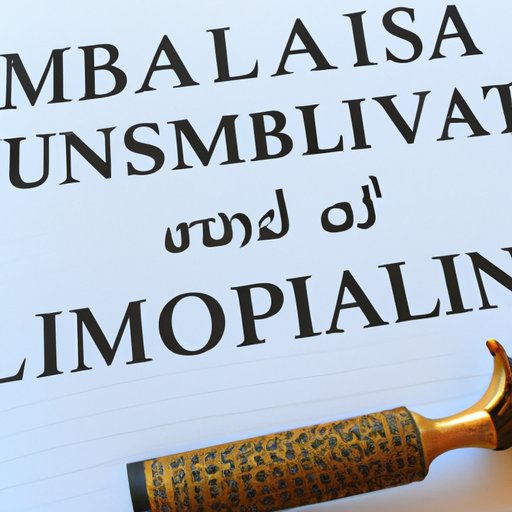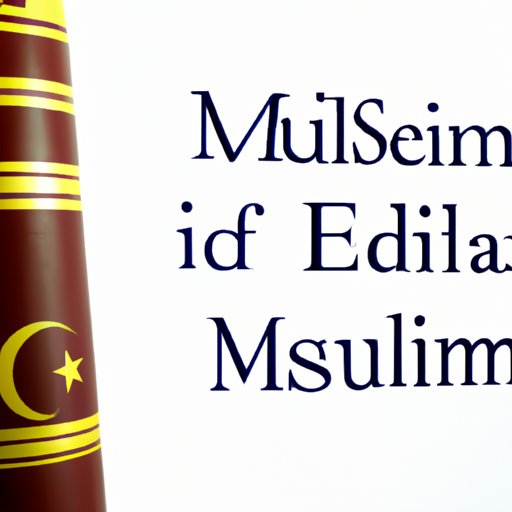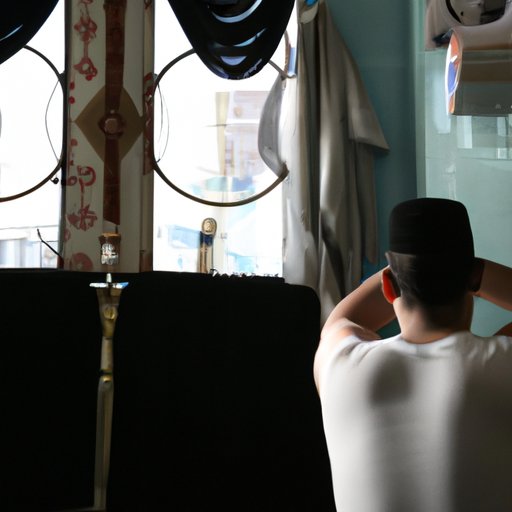Introduction
Islam is a major world religion whose impact on the culture of the Middle East cannot be overestimated. Since its founding in the 7th century, it has shaped the values, beliefs, and laws of the countries in the region. This article will explore the various ways in which Islam has influenced the culture of the Middle East, from its legal system to its educational institutions and religious practices.

Analyzing the Influence of Islamic Law on Middle Eastern Culture
Islamic law, or Sharia, is an integral part of the culture of the Middle East. It is based on the teachings of the Quran and the Sunnah, the sayings and actions of the Prophet Muhammad. Sharia law is applied differently in different countries, but it is generally used to govern family matters such as marriage, divorce, and inheritance, as well as criminal and financial issues. In many countries, Sharia law is seen as the primary source of law, while in others it is used in conjunction with secular laws.
Sharia law has had a profound effect on the societies of the Middle East. It has been used to create a legal system that is largely based on Islamic principles, and it has helped to shape the values and norms of the region. For example, Sharia law dictates that theft is punishable by amputation of the right hand, which has had a significant impact on crime rates in the region.
Islamic jurisprudence has also shaped the legal system of the Middle East. Islamic scholars have developed a set of rules and principles, known as Fiqh, which are used to interpret the Quran and the Sunnah. These rules and principles are often used by judges to make decisions in court, and they have had a major influence on the development of the legal system in the region.
Exploring the Role of Religion in Middle Eastern Society
Religion is an important part of life in the Middle East, and it has had a major impact on the culture of the region. The vast majority of people in the Middle East are Muslims, and Islam is the official religion in most countries. Religious practices such as prayer, fasting, and pilgrimage are an integral part of everyday life in the region.
Religious customs and traditions also play a major role in the lives of people in the Middle East. For example, many families observe Islamic holidays such as Ramadan, Eid al-Fitr, and Eid al-Adha. These holidays are celebrated by Muslims around the world, and they serve as important reminders of the region’s religious heritage.
Religious leaders also have a significant influence on the culture of the Middle East. Imams and sheikhs are respected figures in the region, and they often serve as spiritual guides for their communities. They provide advice and guidance on religious matters, and their interpretations of Islamic teachings shape public opinion and social norms.

Examining the Impact of Islamic Education on Middle Eastern Values
Islamic education has had a major impact on the culture of the Middle East. Schools in the region teach students about the Quran and the teachings of the Prophet Muhammad, and they emphasize the importance of Islamic values such as justice, mercy, and charity. Islamic schools also prepare students for life in the Middle East by teaching them about the region’s history and culture.
The role of religious schools in educating youth has been especially important in recent years. Many countries in the region have experienced rapid population growth, and religious schools have become crucial in providing education to large numbers of students. These schools have helped to shape the values of young people in the region, and they have played an important role in passing down Islamic teachings through generations.
Islamic teachings have also had a significant impact on the values of the Middle East. Islamic values such as respect for elders, hospitality, and generosity are deeply ingrained in the region’s culture, and they have had a major influence on the way people interact with one another. Islamic values have also shaped the region’s attitudes towards gender roles, with men typically taking a more prominent role in society.

Investigating How Religious Practices Affect Everyday Life in the Middle East
Religious practices are an important part of everyday life in the Middle East. Prayer is an integral part of life for Muslims, and it is usually done five times a day. Fasting during the holy month of Ramadan is also common, and many people participate in pilgrimages to the holy cities of Mecca and Medina.
These religious practices have had a major impact on the culture of the region. For example, prayer times often dictate the daily schedule of many people in the Middle East, and fasting during Ramadan can affect the way people eat and socialize. Religious customs and traditions are also passed down through generations, and they help to shape the values and beliefs of people in the region.
Examining the Role of Women in Middle Eastern Cultures Through an Islamic Lens
The role of women in Middle Eastern cultures has been heavily influenced by Islamic teachings. The Quran and the Sunnah contain numerous passages that discuss the rights and responsibilities of women, and these teachings have had a major impact on the status of women in the region.
In many countries in the Middle East, Islamic laws and customs restrict the rights of women. Women are often expected to adhere to strict gender roles, and they may face discrimination in areas such as education, employment, and marriage. Additionally, some countries have laws that limit the freedom of women, such as restrictions on travel and dress.
At the same time, Islamic teachings also give women certain rights and protections. For example, the Quran states that men and women should receive equal treatment under the law, and it forbids the oppression of women. These teachings have had a positive impact on the status of women in the region, and they have helped to ensure that women are treated fairly and with respect.
Conclusion
Islam has had a major impact on the culture of the Middle East. From its influence on Islamic law and religious practices to its role in shaping the values of the region, it has had a profound effect on the societies of the region. Understanding the impact of Islam on the culture of the Middle East is essential for anyone who wishes to better understand the region.
This article has provided an overview of the various ways in which Islam has shaped the culture of the Middle East. It has examined the influence of Islamic law, the importance of religion in the region, the impact of Islamic education, and the role of women in Middle Eastern cultures. By understanding how Islam has impacted the region, we can gain a deeper appreciation for its culture and history.
Recommendations
To better understand the impact of Islam on the culture of the Middle East, it is important to look beyond the headlines and examine the region’s history and values. Reading books and articles written by experts in the field can help to provide insight into the region’s culture and customs. Additionally, engaging in conversations with people from the region can help to provide a better understanding of the region’s values and beliefs.
It is also important to remember that Islam is a complex religion, and its impact on the culture of the Middle East is equally complex. To truly understand how Islam has shaped the region, it is important to take into account the region’s history, politics, and social dynamics. Only then can we gain a comprehensive understanding of the impact of Islam on the culture of the Middle East.
(Note: Is this article not meeting your expectations? Do you have knowledge or insights to share? Unlock new opportunities and expand your reach by joining our authors team. Click Registration to join us and share your expertise with our readers.)
